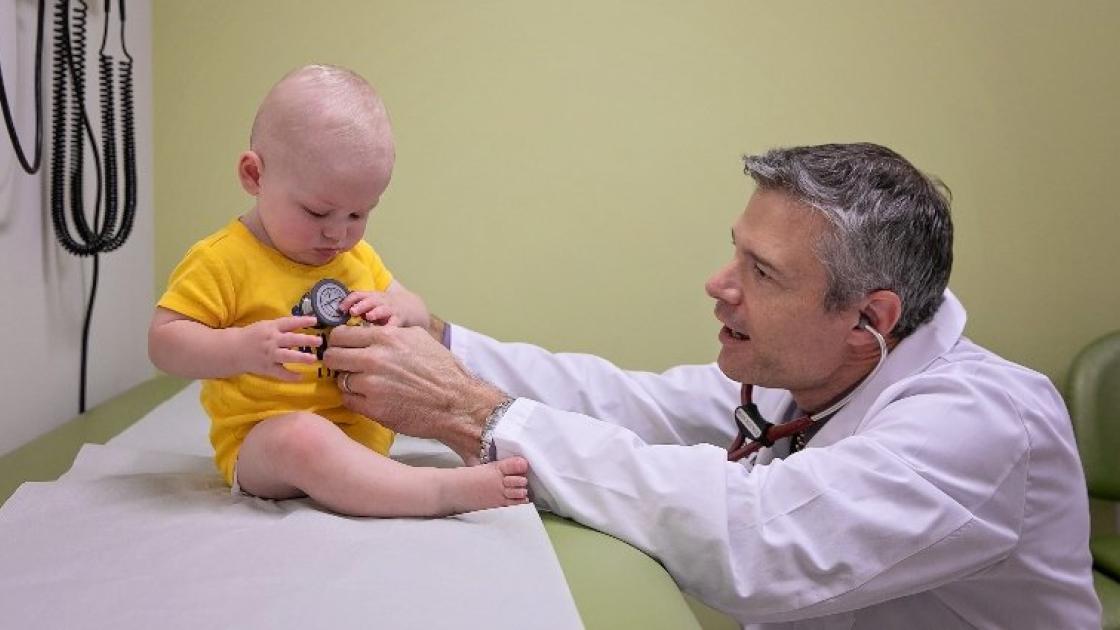
What parents need to know about pediatric pneumonia
According to the World Health Organization, there are 156 million cases of pneumonia each year in children younger than five years; as many as 20 million cases are severe enough that they require hospital admission. Worldwide pneumonia accounted for nearly 800,000 deaths among children less than 18 in 2015.
Children with pneumonia are in good hands at SIU Medicine. The doctors at SIU Medicine provide collaborative care to young patients, based on the latest medical research. The following guide is designed for parents about pediatric pneumonia.
What is pediatric pneumonia?
Pneumonia is an infection of the lungs that causes coughing, fever and trouble breathing. When it happens in patients less than 18 years of age it is called pediatric pneumonia. It is a serious illness, especially in young children.
Pneumonia can be caused by bacteria and viruses. The most likely cause of pneumonia depends on the child’s age
- In infants, toddlers and children less than 5, pneumonia is more likely caused by viruses such as Respiratory Syncytial Virus (RSV), Influenza, Parainfluenza, and Adenovirus.
- In children older than 5, pneumonia is more likely caused by bacteria such as Pneumococcus and Mycoplasma Pneumoniae
What are the symptoms of pneumonia in kids?
Each child may experience symptoms of pneumonia differently. Symptoms might include:
- Cough
- Fever/Chills
- Breathing faster than normal
- Stomach or chest pain
- Trouble breathing or pain when breathing in
- Vomiting
- Headache
- Lack of appetite
- In babies, restlessness or trouble feeding
- Not feeling well
How is pneumonia in children diagnosed?
A diagnosis of pneumonia in children is typically made based on a thorough history and physical exam. At SIU Medicine, your physician might also wish to confirm your child’s illness with:
- Blood tests
- A chest X-ray
If the child is hospitalized and has signs of complicated pneumonia other tests might be needed such as:
- A chest CT scan
- Blood cultures
- Fluid studies
How is pediatric pneumonia treated?
Treatment depends on the child’s age, how serious the pneumonia is, and whether it is caused by bacteria or a virus. Most children can be treated at home but some children who are very sick, especially young children or babies, might need to be treated in the hospital.
Your doctor will create the best treatment plan for your child based on:
- Age, past medical history
- Severity of illness
- Physical exam
- Your child’s tolerance for medicines, therapies, or procedures
Pneumonia that is caused by bacteria is treated with antibiotics. Antibiotics are medicines that kill bacteria. It is very important that your child finishes all of his or her medicine even if he or she starts feeling better before finishing the antibiotics.
Antibiotics do NOT help with pneumonia caused by viruses. Treatment will be mainly symptomatic which will make your child feel better:
- Drinking lots of fluids
- Cool mist humidifier in the child’s room
- Acetaminophen/Ibuprofen
- Antihistamines
Some children have major breathing issues while recovering from pneumonia. They may need to stay in the hospital. While there, they might get antibiotics and fluids through an IV. Oxygen therapy and breathing treatments are also common treatments.
How soon will my child feel better?
Most children start feeling better 2-3 days after starting antibiotic treatment. Children might still feel tired or have a cough for a few weeks after being treated. It might also take few months before he or she can breathe comfortably while exercising.
How is Pediatric Pneumonia prevented?
In the United States, vaccines can prevent infection by some of the bacteria and viruses that can cause pneumonia including Haemophilus Influenzae type b (Hib), pneumococcus, Influenza, Pertussis (whooping cough). All of these can be provided at your primary care physician’s office at SIU Medicine.
If your family is looking for a pediatrician or family medicine physician, call SIU Medicine at 217-545-8000.




